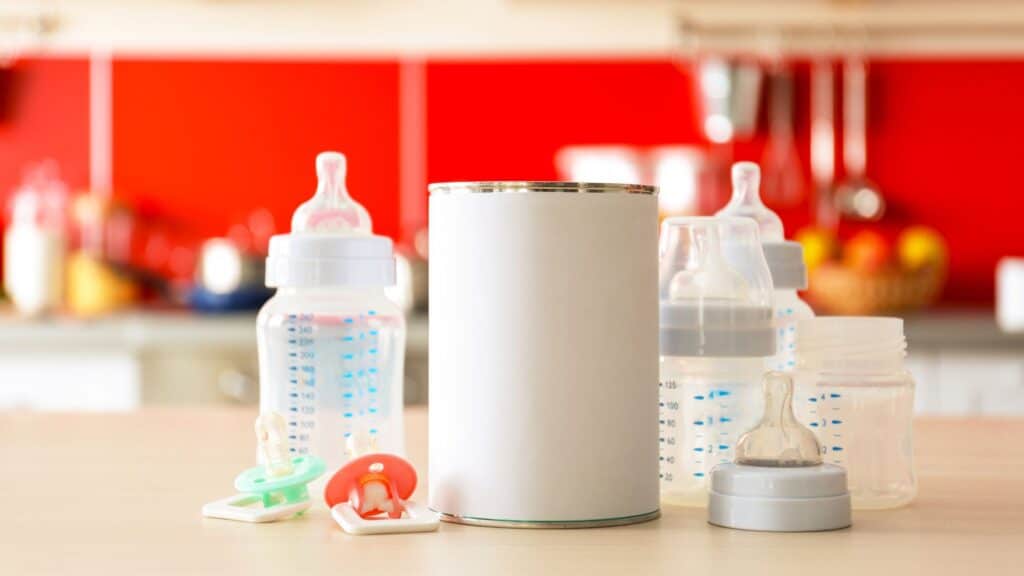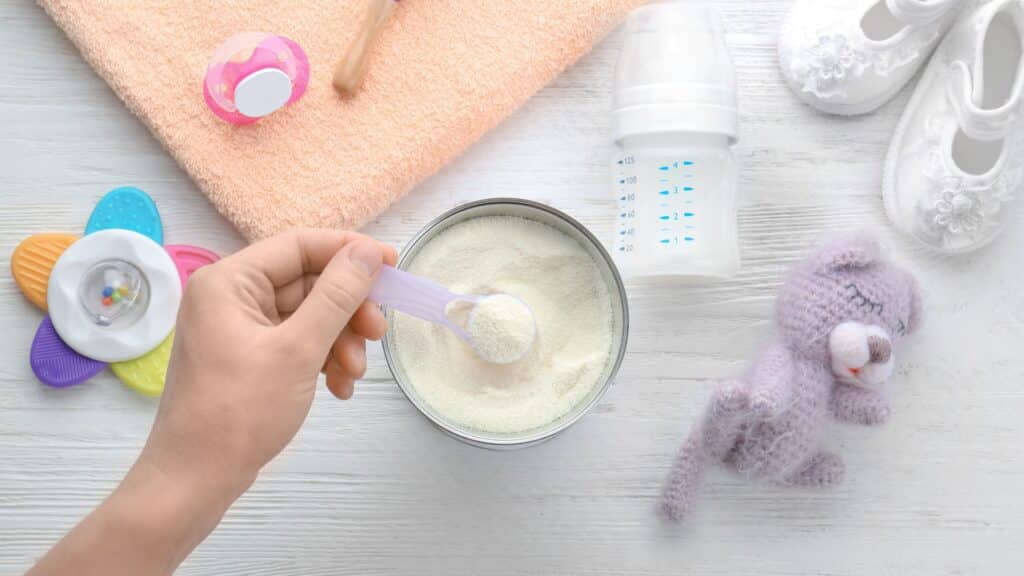Baby formulas are an excellent alternative to give your child the necessary nutrients for their growth. But given so many baby formulas sold today, how will you know the right one?
Many parents and caregivers alike feel anxious when choosing an infant formula. They may be too overwhelmed by the choices available in the market these days. Or maybe, breast milk isn’t working out how they wanted, and a baby formula isn’t what they expected.
No parent or caregiver deserves to feel anxious when feeding their babies. So, the first step that you need to do is to relax and sit for a while. Remember that there isn’t a wrong or right infant formula. There are so many different options, depending on what every parent needs. So, to help you make the right choice, here are a few factors you can consider.

Understanding the Basics of Infant Formula
98% of almost every infant formula consists of fat, protein, and carbohydrates, with the last two having the most impact on your baby’s growth. So, it’s always best to choose a baby formula primarily based on these ingredients.
Also, remember that businesses will use marketing words to attract consumers into buying them. So, if you see terms such as “gentle” and “sensitive,” rest assured that it has nothing unique to its baby formula.
Instead of reading what’s in front of the package, consider looking at the back and reading the list of ingredients. Check the first few ingredients to know the type of carbohydrates and protein used in the infant formula.

Types of Proteins Used in Infant Formulas
Standard Protein Formula
Expect a standard infant formula to have the exact protein size they were when it came from a soybean or cow’s milk. It means that its proteins are much bigger than breast milk, requiring much more time for a baby’s digestive enzymes to break down.
You’ll often see it on the packaging as “nonfat milk,” “whey protein,” or “milk protein isolate.” There are times when you’ll also see it as “soy protein isolate” in soy formulas.
Partially Hydrolyzed Protein Formula
Partially hydrolyzed proteins are smaller compared to standard proteins. That’s because the proteins in these organic formulas are broken down to reduce their size, making them more similar to breast milk proteins.
If you look at the package, you’ll often see words such as”partially hydrolyzed” printed on the packaging. This infant formula is ideal for babies who find it difficult to digest proteins.
Fully Hydrolyzed Protein Formula
Fully hydrolyzed protein formula has the tiniest proteins compared to the other types of infant formulas on the list. Alternatively, it’s also hypoallergenic, making it highly suitable for babies with a cow’s milk protein allergy.
Fully hydrolyzed formulas often have the word “hypoallergenic” printed on the front of the packaging. These infant formulas are ideal for babies with a cow’s milk allergy or those diagnosed with severe digestive issues.

Carbohydrates in Every Infant Formula
Lactose is the primary source of carbohydrates in breast milk. So, if it’s your baby’s first time, then it’s best to choose a lactose-based infant formula and see if your baby will get used to it.
Babies often thrive in a lactose-reduced baby formula if they’re either born prematurely or have irritated digestive tracks. Babies with immature digestive systems can also benefit from this type of baby formula, too. That’s because their digestive tracks tend to produce fewer enzymes that digest lactose.
However, you must remember that your babies still need carbohydrates for energy. So, if your infant formula has reduced lactose, it’s best to find an alternative source of carbohydrates for your baby’s needs. You may consider giving them glucose sugars or sucrose as an alternative.
Factors to Consider When Choosing a Baby Formula
Besides choosing the best-distilled water for your baby, finding an equally ideal baby formula matters. So, here are a few factors you can consider when choosing an infant formula.

Accessibility
One of the most significant factors you must consider when choosing a baby formula is its accessibility. If you can’t usually find it in your local store or it requires you to travel to get it, then it’s best to find another baby formula for your baby’s needs.
Stressing over where to get your baby’s infant formula or brand name is unnecessary. So, check out the stores in your area and see which baby formulas are available. Then, you can start choosing which one is best from there.
Overall Cost and Convenience
The next on the list is the cost. You need to determine how much you’re willing to pay for baby formula and what type would fit your lifestyle.
- Powdered formula is the most affordable formula out of all the ones available on the market these days. Storing this type of baby formula is also much simpler. However, it’s essential to be mindful of the correct measurements and mixture. If you’re out and about frequently and need to feed your baby, remembering this will make life easier.
- Concentrated formula is cheaper than concentrated formula and easier to mix with water than powdered formula. It’s also a good choice for individuals who have trouble preparing their baby’s bottle. However, concentrated formula is more expensive than powdered formula. It may not be an ideal choice for parents and caregivers who are on a budget.
- The most expensive type of infant formula is ready-to-feed baby formula. It makes the most trash and is the heaviest to move, but it’s the easiest to use because it doesn’t need any extra water or mixing.
Overall Content and Ingredient
Companies will use anything they know will convince people to purchase their products. So, don’t get swayed by any of these promises. Instead, take these claims with a grain of salt.
Although many of what they claim are based on scientific theories, there are times when these theories have any direct evidence of benefit. So, always check the content of the baby formula. See if it contains enough protein and carbohydrates to supply your baby’s nutritional needs.
Always Choose the Baby Formula that Works

Once you find an ideal baby formula for your growing baby, it’s best to stick to it. Always remember that hanging baby formulas can stress an already fussy infant.
So, if you need to change it, it’s best to give it at least two weeks for your baby to adjust. That’s why it’s highly advisable to consult your baby’s doctor before changing to a specialty baby formula.
If your baby is still adjusting to the changes. Then, here are a few things that you can try:
- Excess burping. Your baby may experience stomach discomfort from swallowing too much air during feeding. So, it’s best to spend more time burping your baby to ease discomfort.
- Slow-flow nipple. A nipple that flows too fast can also cause your baby to gulp down excessive air during formula feeding. So, consider leveling it down to slow down the flow.
- Teething relief. Your baby may be more grumpy because they are in pain from teething or too tired. Over-the-counter medicines such as acetaminophen can ease your baby from teething pain. Also, ensure that your baby has a healthy sleep routine to get a bit more rest.
What You Need to Know About Homemade Baby Formulas and Imported Infant Formula
The FDA and the American Academy of Pediatrics are highly skeptical about using various recipes to make homemade infant formulas and warn everyone about using them [1]. That’s because these types of baby formulas aren’t regulated, which can lead to serious health complications. Remember that your baby needs specific nutrition for their growth. Using a homemade infant formula might not contain enough nutrients or be too much for their needs.
Also, there’s a chance bacteria may contaminate homemade milk-based formulas, which could also result in an infection or your baby getting sick. Although infant formulas sold also have a chance of contamination. The FDA regularly checks these products and the manufacturing facilities where they’re manufactured to ensure that the powdered infant formula is safe.
Various products are sold in other countries that claim to be “organic” or “natural,” making them sound like they’re a better option for babies. However, no proven scientific studies can back up these claims. Even more, there’s a considerable chance that the FDA has yet to review these illegally imported products, making their claims even more unreliable.
The American Academy of Pediatrics also shares the same sentiments and warns people against using these illegally imported these prepared baby formula products. Keep in mind that the FDA thoroughly regulates all infant formulas sold in the country to ensure that it follows the strict guidelines regarding their nutritional value and safety requirements.

Specialized Formula for Particular Health Considerations
Every baby’s needs are unique. What others consider the best formula may not apply to your growing child’s needs. Here are a few suggestions for a specialized formula that might give you an idea before consulting a pediatrician.
For Babies with Acid Reflux
Acid reflux can be difficult, especially for babies. Although there isn’t a miracle cure to address such concern, you may consider giving your baby a formula that contains high whey content.
That’s because whey proteins remain liquid, making them easier to digest for babies. These thickened cow’s milk formula products may help alleviate reflux symptoms because of their full-size protein content.
For Babies with Eczema
For babies with eczema, a partially hydrolyzed protein formula is the best way to go. Studies show that partially hydrolyzed cow’s milk for formula feeding can benefit infants diagnosed with mild to moderate atopic dermatitis [2]. So, it’s best to choose cow’s milk formula brands with partially hydrolyzed proteins to ensure it’s a good fit for your babies.
For Babies with Constant Constipation
For babies who constantly get constipated, it’s best to speak with your pediatrician to get tips when switching to soy formulas that don’t have palm oil. An excessive amount of palm oil can cause your baby’s still to become firm. Thus, increasing the chances of constipation. So, always check the ingredients and choose a formula that doesn’t contain it.

Summary
Whether it’s cow’s milk or soy protein, it’s always best to choose a product that best suits your baby’s needs. So, besides looking for an iron-fortified formula, choose a product that won’t cause allergic reactions in your baby. It’s also best to choose milk-based formulas that went through the FDA to ensure their quality.
Although many claim that their baby’s formula is the best, they might not necessarily support your baby’s nutritional needs. So, always check the label before purchasing any of these products.
If you have any questions after reading this article, please feel free to leave a comment below!



